However, it was in the 13th century, thanks to the propagation of the Golden Legend by Jacques de Voragine, that their image became established in popular culture.
According to the texts, Anne, daughter of Akar and Emerency of the Tribe of Levi, was born in Bethlehem around the year 55 BC. She is described as a pious and long-sterile woman. Her figure often refers, in the apocrypha, to her Old Testament namesake Hannah, mother of Samuel, prophet and last judge of Israel. Joachim goes back to the royal tribe of Judah, descending from the line of King David. Pious and charitable, he was a sheep pastor in Nazareth and later took care of his father's livestock near Jerusalem.
The stories report that their meeting took place in Jerusalem. Joachim went regularly to the Temple because he took care of its decoration. While he was washing his sheep in the pool of Bethesda, Anne was near the nearby Sheep Gate. After twenty years of marriage, the couple decided to separate because they were unable to give birth. Desperate by their situation which poses many problems in their religious and personal lives, they each fast and pray separately in the hope of being heard by God. Forty days later, an angel appears to them separately to tell them that they will soon be parents.
Their miraculous meeting at the Golden Gate, after the announcement of the upcoming birth of their child, is among the most popular representations of these two saints. In the 13th century, the legendary posterity of Saint Anne spread and resulted in the cult of the Holy Parenthood which also became a popular iconography of the holy parents of the Virgin, in opposition to that of the Holy Family. Their cult gradually declined in the 16th century in the territories affected by the Counter-Reformation. However, in Italy, Saint Anne and Saint Joachim continue to be represented and venerated. They are the patron saints of grandparents and the fertility of couples.
Their miraculous meeting at the Golden Gate, after the announcement of the upcoming birth of their child, is among the most popular representations of these two saints. In the 13th century, the legendary posterity of Saint Anne spread and resulted in the cult of the Holy Parenthood which also became a popular iconography of the holy parents of the Virgin, in opposition to that of the Holy Family. Their cult gradually declined in the 16th century in the territories affected by the Counter-Reformation. However, in Italy, Saint Anne and Saint Joachim continue to be represented and venerated. They are the patron saints of grandparents and the fertility of couples.
The artist of our saints also uses the technique of the trepan, a sort of drill operated by hand using a bow. This tool has been used since Antiquity
in order to reach recesses, clear parts that are difficult to access and rough out small diameter grooves by forming cylindrical cavities. Slow
but precise, the bit is intended for very fragile places and hard materials such as wood, stone and marble. The drill bit technique brings movement and depth to the whole.
Mario Pintaric, professor at the University of Rijeka in Croatia, is a specialist in Italian sculpture. The latter carried out extensive research in order to attribute these sculptures to Jacopo Contiere and his workshop, this sculptor worked at the beginning of the 18th century and its style, particularly in the facial features, is similar with our work.
The statue of St Anne, although smaller in size, has obvious links with the statue of the same name in the Collegiate Church of Rijeka or that of the altar of the Assumption of Mary in the former Jesuit church of Ljubljana .
On the other hand, the physiognomy of Saint Joachim resembles that of Francis Xavier of Mošcenice.
Likewise, in sculpting Saint Joachim, Contieri repeats the usual pose of the figure, as well as the way the drape is formed, which is also present on the sculpture of the same name in Moravca or Coseano.
The sculptures could have been part of one of the many altars dismantled in the region of Venice, Veneto and Friuli. Statues
could be placed on the altar or in the niches of the tabernacle. However, we cannot exclude the possibility that the sculptor made them for a private oratory.
Our two sculptures are therefore part of the production of Italian Baroque from the end of the 17th century with exaggerated movement, dramatic effects, tension in expression and a certain exuberance of forms, like the hand of Saint Anne whose size contrasts with the rest of the body. As Philippe Beaussant said, the Baroque era was “a world where all opposites would be harmoniously possible”.














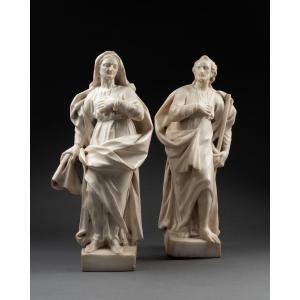












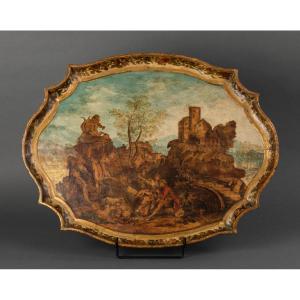



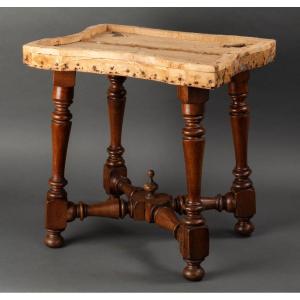
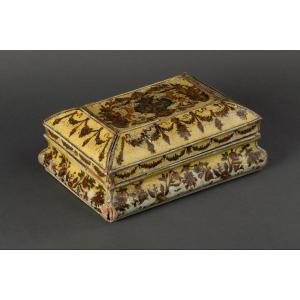

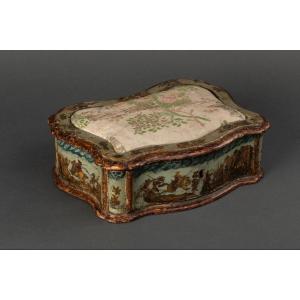
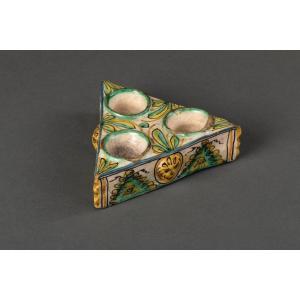



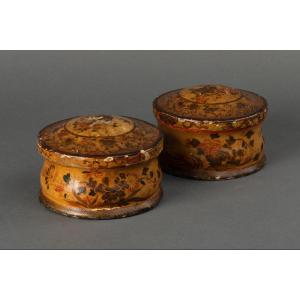

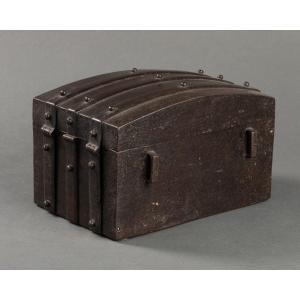








 Le Magazine de PROANTIC
Le Magazine de PROANTIC TRÉSORS Magazine
TRÉSORS Magazine Rivista Artiquariato
Rivista Artiquariato